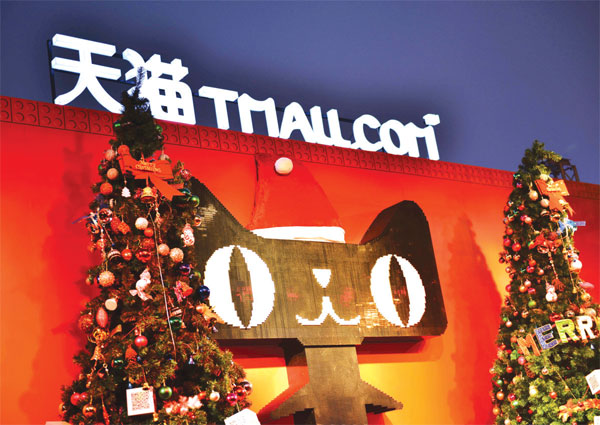Tmall Global's sales rose tenfold in 2014
China has seen a surge in cross-border e-commerce, as millions of Chinese online shoppers buy products directly from foreign websites, sometimes through online marketplaces such as Alibaba's Tmall Global.
Tmall Global, an extension of Tmall.com that enables companies based outside China to directly sell products to Chinese consumers, announced on Monday that its total gross merchandise volume (GMV) has increased 10 times since its launch in February.
The company declined to disclose specific financial numbers.
|
A Tmall logo made from Lego bricks is displayed in Hangzhou, the headquarters of Alibaba Group Holding Ltd. Long Wei / For China Daily |
Tmall Global was created to serve Chinese consumers seeking high-quality products directly from overseas.
The rising spending power of Chinese consumers is creating a tremendous opportunity for Western retailers, Sherri Wu, head of international business development, Americas, and vice-general manager of cross-border business for Alibaba Group Holding Ltd, told China Daily.
"Since launching, Tmall Global has been receiving strong demand from global brands that want to ramp up their participation on the platform in order to ride a wave of growing demand for imported goods amongst Chinese consumers," said Wu.
There are 5,400 foreign brands selling products on Tmall Global, according to the company.
The most popular product categories on Tmall Global are food, cosmetics, maternal products, health supplements, daily necessities and small electronic appliances, according to Alibaba.
Tmall Global merchants could benefit from the large visitor traffic as product listings, search results and traffic shared through all of Alibaba's China retail marketplaces, including Taobao and Tmall, reached 307 million active buyers in the 12 months ended Sept 30, Wu said.
Costco Wholesale Corp, the US warehouse chain that launched its Tmall Global store in October, rang up more than $6.4 million in sales in the first month. During "11.11", China's Singles Day shopping festival, Costco sold about $3.5 million in merchandise in 24 hours, including 300 tons of mixed nuts and dry cranberries.
"Our performance on Singles Day shocked and surprised our management, and it totally transformed our annual business plan," the company said in a statement. "In 2015, we hope to offer Chinese consumers a richer variety of products through the platform and also improve their overall shopping experience."
Nature's Bounty, an American manufacturer of vitamins and nutritional supplements that opened its Tmall Global storefront in August, sold $700,000 in goods through the platform in November, according to Alibaba data.
"What we realized was that there's that group of very educated Chinese consumers looking for us, especially some of our hero products that have sold well in the U.S. market," the company said. "You just can't really find any other platform that would provide you such growth opportunities we will focus on Tmall Global as the main place to tap into the China market."
Wu also shared Tmall Global's plan for the coming year.
"The US will be one of the key markets for Tmall Global in 2015," Wu said. "We are dedicated to supporting US businesses to understand and effectively reach China's 330 million online consumers."
Alibaba opening Tmall Global gives Chinese consumers more access to foreign goods and provides foreign companies solutions to the Chinese market, said Jonathan Li, CEO of the music and picture-sharing site Vibin, which just expanded into China's e-commerce market.
Li said it was difficult to estimate how long the growth will last and whether it will be affected by any new economic policies in the coming year.
"If the Chinese government finds that foreign businesses are doing too well on Tmall, then there may be some limits or taxes applied to better protect domestic companies," Li told China Daily. "Unless Alibaba finds new untapped users, I don't expect another tenfold increase next year.
zilian@chinadailyusa.com



















